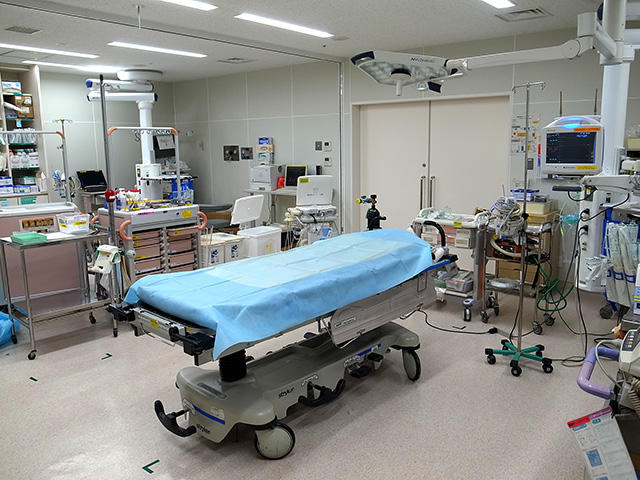Hiroo Hospital is an Emergency and Disaster Medical Center with an improved system as a base for emergency medicine, disaster medicine, and medical care for the isolated islands. We provide advanced and specialized medical care and strive to provide patient-centered medical care as one of our missions.
- Emergency medical care
- Disaster medicine
- Medical care for the isolated islands
- Cardiovascular disease treatment
- Cerebrovascular disease treatment
Emergency medical care
- Tokyo ER Hiroo provides primary emergency care to tertiary emergency care in severe and serious cases for patients with various symptoms 24 hours a day, 365 days a year. We accept about 20,000 emergency patients per year, including about 5,000 cases via ambulance transport and nearly 900 cases of emergency life support.
- The Emergency Care Center for tertiary emergency care accepts patients with serious injuries and diseases that cannot be treated in other medical institutions, such as patients with broad burns, acute intoxication, amputation, and nerve injury.
- Tokyo ER Hiroo forms a part of the emergency network covering the entire Tokyo metropolitan area, for example by participating in the CCU Network for myocardial infarction and in the Burn Emergency Liaison Council.


Disaster medicine
- Hiroo Hospital was designated a Core Disaster Base Hospital in 1997. We have improved emergency medical care that forms the basis for activities in disasters since then and pioneered in preparing BCPs (Business Continuity Plans) to be a model for other hospitals. We have accepted visitors from other medical institutions in more practical disaster activity drills to popularize BPC. We have performed a variety of activities as a model disaster medical care system under the leadership of the Disaster Risk Reduction Support Office.
- Currently, Hiroo Hospital has a role as a Core Disaster Base Hospital and hosts Regional Disaster Medical Care Liaison meetings as a Local Disaster Base Hospital with a local disaster medical care coordinator in the southwest area of Minato ward. We also prepare and adjust plans for disaster medical care graphical drills.


Medical care for the isolated islands
- Hiroo Hospital installed a rooftop heliport as part of a total renovation in October 1980. Since then, we have set medical care for the isolated islands as an important activity of the Hospital and thus provide emergency medical care for people on the seven islands of the Izu and Ogasawara Islands.
- As the core Island Emergency Medical Care System constructed by the Bureau of Social Welfare and Public Health (base hospital), we accept 80% of emergency patients from the Izu and Ogasawara Islands for improvement of medical care on these islands. The rooftop heliport operates 24 hours a day to accept serious patients transferred from the islands by helicopter.
- Hiroo Hospital provides diagnostic aid, such as imaging diagnosis and consultations, using the Image Transmission System for Medical Care on Isolated Islands to support medical activities in the clinics and hospitals on the islands. The Image Transmission System also functions as a web conference system between the medical institutes on the islands, the metropolitan office, and Hiroo Hospital.
- We have continuously convened the Study Group for Medical Care on Isolated Islands since 2008 by doctors and emergency personnel on the islands and have constructed a support and cooperation system for doctors providing medical care on the islands. This study group facilitates the exchange of information on island medical care and examines solutions to issues.


Cardiovascular disease treatment
Through collaboration between the Cardiology and Cardiovascular Surgery Departments, medical care is provided for all cardiovascular diseases from arrhythmia to ischemic heart disease.
We have top-class results for arrhythmia treatment centered on catheter ablations in the Tokyo metropolitan area. As the 11th practice institution (chest and abdomen) certified in Japan by the Japanese Committee for Stent-Graft Management, we provide advanced specialist medical care, such as the proactive use of aortic aneurysm stent grafting.


Cerebrovascular disease treatment
We provide advanced specialist medical care focused on the treatment of severe strokes, such as subarachnoid hemorrhages, with cooperation among the Neurosurgery Department, Neurology Department, Emergency Care Center, and Radiology Department, for example by performing emergency MRIs. We strive to minimize the burden on patients by performing advanced and minimally invasive endovascular treatment, such as coil embolization for a cerebrovascular disease subarachnoid hemorrhage, stent placement for internal carotid artery stenosis, and thrombolysis treatment (t-PA) for hyperacute occlusive cerebrovascular disease.
Last updated:2018/2/28

